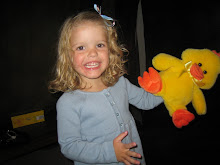1. Hair - This one is kind of obvious. You lose your hair, explaining why people receiving chemo are bald. We were told that we probably wouldn't see much significant hair loss until after Gracie's second round.
2. Mucous linings - In particular the lining of the GI system is effected all the way from the mouth to the very end. She can develop sores anywhere in her mucousal lining, this sometimes could make it difficult for her to eat unless her food is soft. This is why Gracie needs special mouthwash four times a day to keep her mouth clean so that it is less likely to develop sores (also a potential port for infections).
3. The blood - First I'll do an over view of the components of blood. You've got your red cells, white cells and platelets. All of these components are effected by the chemo and their counts drop as a result. The counts are usually at their lowest 7-10 days after chemo therapy is administered.
The red cells carry the oxygen which is needed for energy. When her red cells drop her energy levels will drop too. Plus she'll look pale.
White cells are required to fight off disease. She will be immunocompromised throughout her treatments. As such she needs to take antibiotics three days a week for at least a year. A germ that would do nothing to a healthy child could land her in the hospital for IV antibiotics or worse. In the words of the oncologist she could go from being just fine to the ICU in half an hour. ANY signs of illness needed to be taken very seriously and any one who is ill need to be kept away from her. This is why she'll be taking a break from church for the next six months. She's still allowed to play with other kids though, we just need to make sure they're all in good health. And wash, wash, wash your hands!!!!
Platelets are required for your body to heal after cuts and scratches. They kind of collect at the site and form natures bandage. When her platelets are low she'll have a more difficult time healing, and open skin is a gateway for infection making it a double whammy.
Her counts for all of these blood components will definitely be down during chemo, if they get dangerously low then she'll receive blood or blood product transfusions. This is why she gets blood tests twice a week to determine what her counts are. In order to help her counts build themselves up again she'll receive injections (subcutaneous for the medical type) of G-CSF once a day for between 7-14 days after every round of chemotherapy. This shot helps her counts recover quicker than they would on their own.
In addition to these effects there are other common side effects for each of the drugs which she's receiving. Not the least of which is nausea, it's kind of legendary with chemotherapy. Fortunately they have a very effective drug to combat this now - if only we didn't have to fight with insurance to get it. The nausea can occur at any time during the months she's being treated. If the drugs don't control it then she'll need to be hospitalized to receive IV fluids.
All of these effects listed above have a cumulative way about them. Meaning we can expect them to get worse with every round of chemotherapy. So we might only notice a slight decrease in energy this round, but after the 6th round she may just sleep for 2 weeks.
The good thing about her being so young is that she won't have to deal with the depression that most older people with cancer face. She's young and oblivious to it all. Even with all that they were doing in the hospital she was so cheerful. They were checking her blood pressure every 15 minutes during the chemo and she'd just say in her perky little voice "Are you hugging my arm again?!" Okay when she was asleep she wasn't as impressed with it, but she's usually very happy. I think adults could learn a lot from visiting a pediatric oncology unit. Some of these little kids are so very very sick. I could hear one of them heaving from all the way down the hallway. My heart went out to him/her and their family. And yet they throw up and then move on and smile even when they still feel yucky. It's so amazing. Obviously happiness is a choice, it's not something you're dealt.
It's so good to be home. I was headed out of Houston as the National Guard was coming in. Rows and rows of military vehicles were driving in and helicopters were circling about. I hope the city weathers the hurricane well. We'll be remembering all of our new friends we made in Houston over the last couple days and pray that their families and homes stay safe. Also that the medical center stays running well so no one's care is delayed. Thanks for your support,
Stephanie



1 comment:
Stephanie, thanks so much for your insightful entry. Even though my father went through chemo I didn't understand the process as well as you have just described it. So glad to hear you got out of Houston before the cars started lining up too much. Cancer doesn't wait for things like hurricanes to pass, so it's a real blessing you were able to get in and out of there when you did. Hugs, Celia
Post a Comment